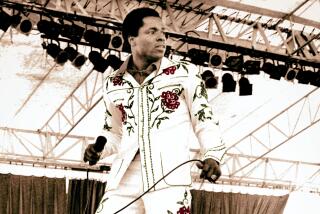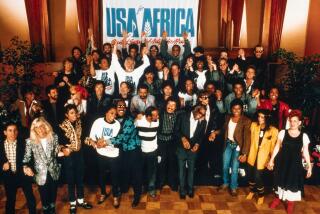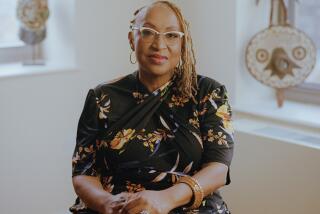Good Golly! A Look Behind the Scenes
The endless parade of New Orleans and Memphis R&B; retrospectives doesn’t just give us samples of the most infectious music of the modern pop era. The various compilations also frequently offer revealing glimpses into the record-making process.
Consider track 14 on Specialty Records’ new “Creole Kings of New Orleans, Volume Two” compilation.
The selection is a demonstration tape by celebrated producer Bumps Blackwell of the song “Good Golly Miss Molly,” which went on to become one of the landmark hits of rock pioneer Little Richard.
The extraordinary thing about the tape--which was previously unreleased--is that Blackwell considers giving the song, which he wrote with John Marascalco, to one of Specialty’s other singers.
“Say, Pappy,” Bumpwell says on the tape, which he sent to Specialty Records head Art Rupe in Los Angeles, “this is a number (thrown together) for Little Richard that he didn’t show up and do. . . .
“So we figured we ought to put it on a tape and let you hear it. . . . and then see if Little Richard can do it on the 29th or something or whether we should give it to someone else.”
Whoever decided that Little Richard indeed should record “Good Golly” certainly made the right decision. The single went into the Top 10 on both the pop and R&B; charts in 1958--and remains a staple in the ‘50s rock catalogue.
There’s nothing else on this 25-song collection as revealing as the Blackwell demo, but “Creole Kings” is a highly listenable package, including two Lloyd Price hits (“Restless Heart” and “Ain’t It a Shame”-- not the Fats Domino-Dave Bartholomew song) and Larry Williams’ 1957 version of “Just Because” (a song that had been a hit earlier for Price). Among the other artists represented: Guitar Slim, Clifton Chenier, Art Neville and Professor Longhair.
The album was compiled and produced by Billy Vera, who also contributed entertaining liner notes. Besides offering background on each of the album’s recordings, Vera tells the story of Specialty’s Art Rupe going to New Orleans in the early ‘50s, his goal to find a hit-maker like Imperial Records’ Fats Domino for his own label.
After what Vera describes as endless auditions, a frustrated Rupe was about to return home to Los Angeles when “a very young Lloyd Price broke down in tears as he sang his song for the record man, who stayed on to produce the biggest (R&B;) record of the year, ‘Lawdy Miss Clawdy.’ ”
“The record, which featured Bartholomew’s band with Fats on piano, wound up being one of the first to sell in large quantities to both black and white fans.” Among the single’s biggest fans: a young Elvis Presley, who later recorded it himself.
More to Read
The biggest entertainment stories
Get our big stories about Hollywood, film, television, music, arts, culture and more right in your inbox as soon as they publish.
You may occasionally receive promotional content from the Los Angeles Times.










